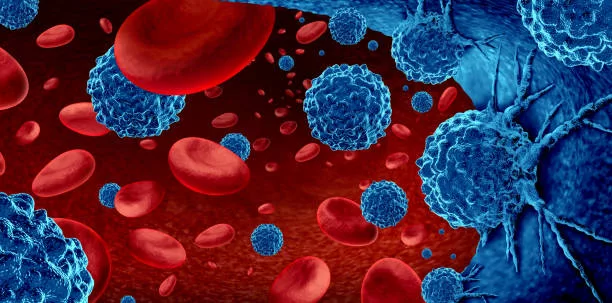Blood Cancers
Blood cancers are cancers that affect the bone marrow (where blood is produced), lymphatic system, or lymph nodes, which are critical parts of the body’s immune and circulatory systems. Unlike solid tumors that form lumps or masses, blood cancers primarily involve the abnormal growth of blood cells or cells within the bone marrow or lymphatic system.
There are three main types of blood cancers
Leukemia
Leukemia is cancer that starts in the bone marrow or other blood-forming tissues, leading to the production of abnormal white blood cells. These abnormal cells can crowd out healthy blood cells, impairing the body’s ability to fight infections. They also impair the ability to produce red blood cells that carry oxygen and platelets that control bleeding and clotting.
There are several types of leukemia, classified based on how quickly the disease progresses and the type of blood cell involved:
- Acute leukemia (fast-growing)
- Acute lymphocytic leukemia (ALL): Affects lymphoid cells (a type of white blood cell)
- Acute myeloid leukemia (AML): Affects myeloid cells (which normally develop into red blood cells, white blood cells, or platelets)
- Chronic leukemia (slow-growing)
- Chronic lymphocytic leukemia (CLL): Affects lymphoid cells and typically progresses more slowly
- Chronic myeloid leukemia (CML): Affects myeloid cells and can progress from a chronic phase to a more aggressive acute phase
Lymphoma
Lymphoma is cancer of the lymphatic system, which includes the lymph nodes, spleen, and other organs involved in the immune response. Lymphomas are characterized by the abnormal growth of lymphocytes (a type of white blood cell), which leads to the formation of tumors in lymphatic tissues.
The two main types of lymphoma are:
- Hodgkin lymphoma (HL): Characterized by the presence of Reed-Sternberg cells, which are large, abnormal cells found in lymph nodes. It is relatively rare but has a higher cure rate compared to non-Hodgkin lymphoma.
- Non-Hodgkin lymphoma (NHL): A diverse group of cancers that involve abnormal growth of lymphocytes. NHL can be slow-growing (indolent) or fast-growing (aggressive), and it may occur in the lymph nodes or other organs.
Myeloma (Multiple Myeloma)
Myeloma, specifically multiple myeloma, is a cancer that begins in plasma cells, a type of white blood cell found in the bone marrow. Plasma cells normally produce antibodies that help fight infections, but in multiple myeloma, abnormal plasma cells multiply uncontrollably, leading to bone damage, kidney problems, and a weakened immune system.
In myeloma, the abnormal plasma cells often accumulate in the bone marrow and interfere with normal blood cell production. As the disease progresses, it can result in the formation of tumors in the bones, causing bone pain and fractures.

Common Symptoms of Blood Cancers
- Fatigue or weakness
- Frequent infections
- Unexplained weight loss
- Fever or chills
- Swollen lymph nodes (in lymphoma)
- Bruising or bleeding easily (due to low platelets)
- Pain or tenderness (especially in bones in myeloma)
- Shortness of breath (due to anemia)
- Night sweats
Guiding You from Diagnosis to Recovery
At Lowcountry Oncology Associates, we provide expert care for all types of blood cancers, including leukemia, lymphoma, and myeloma. Our board-certified physicians use advanced diagnostic tools and the latest treatment options to deliver personalized care plans tailored to each patient. From diagnosis through recovery, our team is here to guide and support you every step of the way.

